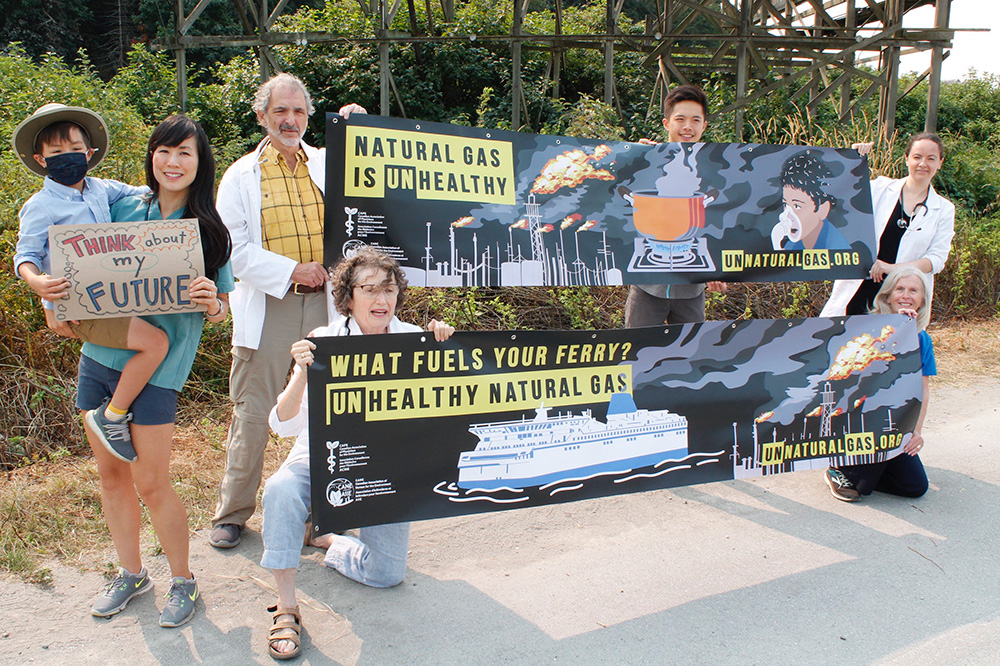People heading toward the Tsawwassen ferry terminal last weekend may have spotted an eerie sign of the times — a handful of doctors and nurses, standing under smoky skies, hoisting banners warning against the climate threat from liquified natural gas.
The group gathered to launch Unnatural Gas, a public awareness campaign by the Canadian Association of Physicians for the Environment and Canadian Association of Nurses for the Environment about the climate and health damage from natural gas.
The associations say plans for an LNG industry in B.C. — including the $18-billion LNG Canada plant under construction in Kitimat — will drive an increase in gas production in the province’s northeast, largely from fracked wells.
They kicked off the campaign with two large billboards along the causeway leading to BC Ferries’ Tsawwassen terminal and the weekend demonstration.
For Helen Boyd, a registered nurse from Comox and B.C. representative for CANE, taking on the natural gas industry is a matter of social justice.
“We wanted to emphasize the health impacts from upstream production sites, particularly the Peace River region,” Boyd said.
Boyd says natural gas extraction is polluting, and living near wells where companies use hydraulic fracturing to extract natural gas from shale can lead to serious health impacts.
According to the Unnatural Gas website, there are 20,000 fracked wells in northeastern B.C., covering five times as much land as the Alberta oilsands mines. Almost all B.C. natural gas comes from fracking, which involves injecting water, chemicals and sand underground at high pressure to crack rocks and allow the gas to flow.
Boyd says low birth rates, lung cancer, premature births, higher chances of childhood leukaemia, asthma and exacerbation of respiratory illnesses are linked to living near fracking sites.
It's important to raise awareness in southern B.C., where natural gas is used in homes and to heat buildings, while northern B.C. communities are dealing with the health impacts, Boyd says. BC Ferries also powers five of its ships with LNG, and plans to increase its use.
Dr. Kevin Liang, a University of British Columbia family medicine resident who created the Unnatural Gas website, said it's also important to raise awareness about the climate impacts of natural gas.
“A lot of people think natural gas is a transition fuel,” Liang said, offering a cleaner alternative to coal or diesel.
But they shouldn’t, he said. Natural gas infrastructure leaks methane, its main ingredient, into the atmosphere.
And methane is a greenhouse gas with 84 times more climate warming impacts than CO2 over a 20-year period, Liang says.
Reports consistently find provincial and federal governments under-report methane emissions from the gas sector.
In July, the Energy and Emissions Research Lab at Carleton University published a report saying methane emissions from B.C.'s oil and gas industry are 1.6 to 2.2 times higher than reported by the federal government.
That worsens global heating, which has brought extreme weather and wildfires to the province this summer.
At the Vancouver clinic where he's working as a resident, Liang says he's seen an increase in people needing inhalers and suffering from respiratory issues and health issues related to B.C.'s heat waves.
Liang says the billboards weren’t placed by the Tsawwassen terminal to target BC Ferries, but because they want to educate British Columbians travelling over the summer.
But anyone on the BC Ferries fleet may notice large advertisements for FortisBC promoting the corporation’s transition from diesel to LNG.
That's part of BC Ferries 2019 Clean Futures Plan to transition 40 per cent of the fleet to all-electric or low-carbon fuel by 2030.
Switching to natural gas will displace more than 22 per cent of the fleet's diesel fuel consumption, reduce the carbon intensity of the fuel burned and support domestically sourced fuel, according to the Clean Futures Plan.
Nik Pavlenko, senior researcher with the International Council on Clean Transportation's fuel team, says that’s more greenwashing than green.
Pavlenko says switching to LNG won't benefit the climate, because the lifecycle emissions from natural gas are equal to, if not worse than, other fossil fuels.
LNG burns cleaner, but that's just measuring what comes out of the smokestack, Pavlenko says.
“LNG has lower CO2 emissions and lower particulate emissions which are considered for local air quality,” he says. “But when you actually look at what it takes to produce LNG and the impact of methane leakage throughout its lifecycle, we see LNG can actually have worse impacts than the fuels it's replacing.”
Methane can have 20 to 85 times the impact of CO2 emissions, so even if a small amount leaks out during its lifecycle of fracking to ferry power there can be substantial implications, he says.
Pavlenko says ferries have some of the leakiest engines, with methane escaping before its burned or released due to incomplete combustion.
“When you take into account not only the upstream leakage, but also the slip that's happening on the ship, adding that all up can greatly increase emissions compared to liquid petroleum fuels,” Pavlenko says.
So why would BC Ferries be so eager to switch to LNG as a fuel source?
Pavlenko says that answer is likely financial instead of environmental.
“LNG is a cheap source of fuel, especially compared to genuinely better lower-carbon alternatives like hydrogen or electricity,” he says. “It gives those who switch to LNG an opportunity to claim they're making a difference while not spending much money while doing it.”
BC Ferries did not respond to an interview request by publication time.
As part of the public awareness campaign, CAPE and CANE are calling on the B.C. government to implement a moratorium on fracking expansion; a just transition for workers; investments in zero-emission buildings; and an end to fossil-fuel subsidies.
Boyd pointed to a recent Stand.earth analysis that found the B.C. government spent $1.3 billion on fossil fuel subsidies in 2020–2021.
Energy Minister Bruce Ralston told The Tyee that number didn't tell the whole picture and contested Stand.earth's definition of a fossil fuel subsidy.
On Monday The Tyee requested an interview with Ralston but he was not made available. In an email, the Ministry of Energy, Mines and Low Carbon Innovation said it was undertaking a comprehensive review of the province's oil and gas royalty system “to ensure it meets our goals for economic development, a fair return on our resources, and environmental protection.”
The BC NDP promised the review of provincial royalty programs during the 2019 election campaign. The province did not respond to The Tyee's questions about when the review would be completed. ![]()
Read more: Energy, Environment
















Tyee Commenting Guidelines
Comments that violate guidelines risk being deleted, and violations may result in a temporary or permanent user ban. Maintain the spirit of good conversation to stay in the discussion.
*Please note The Tyee is not a forum for spreading misinformation about COVID-19, denying its existence or minimizing its risk to public health.
Do:
Do not: